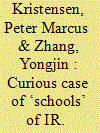| Srl | Item |
| 1 |
ID:
153425


|
|
|
|
|
| Summary/Abstract |
The bureaucratic politics model of foreign policy decision making is predicated in large part by Miles' Law, which states that “where you stand depends upon where you sit.” That is, an actor's policy preferences can be predicted from his or her governmental position or role within the bureaucracy. Consequently, secretaries of state in the U.S. foreign policy decision-making process are then presumed to favor policy options emphasizing diplomacy and civilian efforts. However, Hillary Clinton has proved to be a consistent hawk during her tenure as secretary of state. Specifically, she was one of the strongest advocates of the use of military force in both Afghanistan and Libya. This paper examines Clinton's policy preferences in the context of the Afghanistan troop surge and the U.S. role in the international military operation in Libya to probe whether the secretary's failure to conform to Miles' Law is an anomaly or presents important questions regarding the possible disjunction between institutional and individual interests and their respective influences on actors' policy preferences.
|
|
|
|
|
|
|
|
|
|
|
|
|
|
|
|
| 2 |
ID:
156807


|
|
|
|
|
| Summary/Abstract |
This article interrogates the questions evoked by the curious case of ‘schools’ of thought in International Relations (IR) through the twin perspectives of the sociology of knowledge and geopolitics of knowledge. Drawing inspirations from the tradition of the sociology of IR pioneered by E. H. Carr, the paper first explores how geo-epistemic diversity can help understand the sociologically problematic nature of IR knowledge production in the existing discipline. Taking cues from Randall Collins’s sociology of philosophies, the article moves to identify four clusters of sociological conditions and dynamics that, we argue, facilitate the formation and sustain the operation of schools of thought in IR. Taking seriously the recent insight from geopolitics of knowledge, the article then looks at why and how school labelling constitutes a battleground for contestation and legitimation of knowledge. While the ‘core’ uses the school label to create a parallel, and explicitly inferior, universe of knowledge production to localize theoretical noises from the peripheries, the school label, we argue, has been proactively appropriated by those at peripheries and semi-peripheries for three strategic purposes: to engage in a purposely contentious politics, to question the claim of the American ‘core’ as the creator, depositor, and distributor of universal knowledge, and to unveil the geo-historical linkage between the political and the epistemic. School labelling matters, we further argue, because it has become a site of contestation of geopolitics of knowledge and reflects the perils and promises in our collective pursuit of constructing a truly global IR.
|
|
|
|
|
|
|
|
|
|
|
|
|
|
|
|